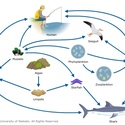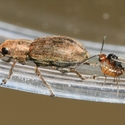Genetic modification1 of organisms is a very controversial issue in New Zealand. Regulatory controls have been developed to try to manage the risk of research using genetically modified2 organisms (GMOs).
Researchers at AgResearch investigated ways to genetically modify a nematode worm so that it could be used to help control possum numbers. The worm is a common parasite in possums, but in its natural form does not harm the possum it lives in. For the research, the worm would be genetically modified so that it could produce a chemical which will make possums infertile.
Genetic modification of organisms
Genetic modification of organisms is a very controversial issue in New Zealand. Regulatory controls have been developed to try to manage the risk of research using genetically modified3 organisms (GMOs).
The Environmental Protection Authority is responsible for giving permission to develop genetically modified organisms. The public also need to be consulted before any genetically modified organisms can be released.
End of the projects
Significant research effort and resources were put into possum contraceptive vaccines and hormone4 toxins. Funding for the projects finished in September 2010, partly due to risks associated with the biocontrol5 agents and controversy over genetic engineering6.
- genetic modification: Genetic modification (GM) is any process that changes the genetic material of an organism (plant, animal, bacteria or virus) in order to make it capable of producing new substances or performing new or different functions.
- genetically modified: An organism (plant, animal, bacterium or virus) whose genome has been altered by human intervention. Alterations can include the addition or deletion of DNA sequences and the introduction of DNA sequence changes.
- genetically modified: An organism (plant, animal, bacterium or virus) whose genome has been altered by human intervention. Alterations can include the addition or deletion of DNA sequences and the introduction of DNA sequence changes.
- hormone: A chemical substance secreted by an endocrine gland into the bloodstream. It acts on specific target cells to produce a given response to control and regulate the activity of certain cells or organs.
- biocontrol: Using one living organism or virus to control the population size of another organism, usually a pest for example, using the rabbit haemorrhagic virus to control rabbit numbers.
- genetic engineering: Genetic engineering (GE) is any process that changes the genetic material of an organism (plant, animal, bacteria or virus) in order to make it capable of producing new substances or performing new or different functions.







